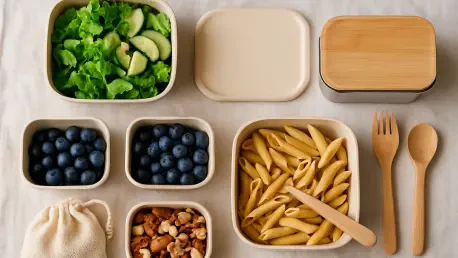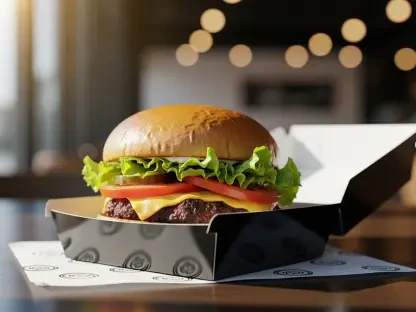In an era where the foodservice industry grapples with mounting pressure to curb waste, a staggering statistic emerges: millions of tons of single-use packaging end up in landfills each year, contributing to environmental degradation. Amid this challenge, Eco-Products, a leading name in sustainable packaging, has captured attention with its groundbreaking Veda reusable container system. This innovation, recently honored with the Balpex Innovation Center Award in 2025, signals a pivotal moment for the sector, offering a glimpse into how reusable solutions can transform operational norms and reduce ecological footprints. This report delves into the broader landscape of sustainable foodservice packaging, exploring trends, challenges, and future directions while spotlighting the significance of this award-winning achievement.
Overview of the Sustainable Foodservice Packaging Industry
The foodservice packaging industry plays a critical role in global efforts to minimize environmental harm, driven by the urgent need to address waste and resource depletion. This sector encompasses a wide range of products, from single-use disposables to reusable systems, each with distinct implications for sustainability. As consumer demand for eco-friendly options rises, the industry has become a focal point for innovation, with companies striving to balance functionality, cost, and environmental responsibility.
Key players such as Eco-Products and Novolex lead the charge, alongside a growing number of startups and established firms investing in green technologies. The market is broadly segmented into disposable and reusable packaging, with the latter gaining traction as a cornerstone of circular economy models. Technological advancements, including smart tracking systems and durable materials, are reshaping how products are designed and deployed, pushing the boundaries of what sustainable packaging can achieve.
A notable shift within the industry is the increasing emphasis on circular systems and zero-waste goals. Governments, businesses, and consumers are aligning around policies and practices that prioritize waste reduction, fostering an environment where reusable solutions are not just desirable but essential. This momentum underscores the importance of scalable innovations that can integrate seamlessly into diverse foodservice settings, from restaurants to institutional dining halls.
Innovation and Trends in Sustainable Foodservice Solutions
Emerging Practices and Consumer Demand
Recent years have witnessed a profound transformation in foodservice packaging, with reusable systems emerging as a dominant trend. Innovations like smart technology for tracking container returns are streamlining operations, making reuse programs more feasible for large-scale adoption. These advancements address long-standing concerns about convenience and efficiency, paving the way for broader acceptance across various sectors.
Consumer behavior is also evolving, with a marked preference for sustainable options influencing purchasing decisions. This shift is particularly evident in institutional settings such as campus dining and hospitals, where demand for eco-conscious solutions drives procurement strategies. Environmental awareness acts as a powerful market driver, encouraging operators to adopt practices that align with public expectations and long-term sustainability goals.
Opportunities for scalable reuse programs are abundant, especially as educational campaigns and institutional partnerships amplify their reach. The push toward zero-waste initiatives further fuels this trend, creating fertile ground for innovations that can meet both operational and ecological needs. As these practices gain momentum, they redefine industry standards, setting a new benchmark for what constitutes responsible foodservice packaging.
Market Impact and Growth Potential
The adoption of sustainable packaging solutions is accelerating, with market performance reflecting robust growth in recent data. Industry projections suggest a significant uptick in reusable system implementation over the next few years, from 2025 to 2027, driven by heightened regulatory focus and consumer advocacy. This trajectory highlights the sector’s potential to reshape waste management practices on a global scale.
Innovations like the Veda system by Eco-Products are poised to influence industry standards, offering a model for integrating durability and technology into reusable solutions. Such systems not only address immediate waste reduction needs but also set a precedent for broader adoption across diverse foodservice environments. Their success could catalyze a wave of similar products, further expanding the market for sustainable alternatives.
Looking ahead, the growth potential for reusable packaging appears promising, as stakeholders recognize the long-term cost savings and environmental benefits. This forward-looking perspective underscores the importance of continued investment in research and development, ensuring that emerging solutions remain both practical and impactful. As these trends unfold, they promise to redefine the competitive landscape of foodservice packaging.
Challenges in Adopting Reusable Systems in Foodservice
Implementing reusable packaging systems in foodservice settings presents several hurdles, with operational costs topping the list of concerns. Establishing the necessary infrastructure for collection, cleaning, and redistribution demands significant upfront investment, often deterring smaller operators from making the switch. This financial barrier remains a critical obstacle to widespread adoption.
Beyond cost, logistical and technological challenges complicate the integration of reusable systems with existing frameworks. Ensuring high container return rates and syncing with meal plan systems require sophisticated coordination, often necessitating tailored software and hardware solutions. These complexities can strain resources, particularly for institutions with limited technical expertise or capacity.
Solutions to these challenges lie in strategic partnerships and public engagement. Collaborations with technology providers like OZZI can streamline operational processes, while educational campaigns can boost user participation by highlighting the benefits of reuse. Addressing these barriers through innovative approaches and stakeholder cooperation is essential to unlocking the full potential of reusable systems in foodservice.
Regulatory and Ethical Standards in Sustainable Packaging
The regulatory landscape for foodservice packaging continues to evolve, with stringent guidelines on waste reduction and material safety shaping product development. Governments worldwide are enacting policies to curb single-use plastics, mandating alternatives that prioritize environmental health. Compliance with these regulations is not just a legal obligation but a competitive differentiator for companies in the sector.
Ethical standards also play a pivotal role, as certifications like B Corp status signal a commitment to social and environmental responsibility. Such credentials influence consumer trust and guide internal practices, ensuring that sustainability remains at the core of business operations. Companies adhering to these principles often gain a market edge, appealing to a growing base of eco-conscious stakeholders.
Industry awards, such as the Balpex Innovation Center Award, further elevate the importance of ethical and innovative practices. By recognizing groundbreaking solutions, these honors set benchmarks for excellence, encouraging firms to push the boundaries of sustainable design. This recognition fosters a culture of continuous improvement, driving the sector toward higher standards of accountability and impact.
Future Directions for Reusable Foodservice Packaging
The trajectory of the foodservice packaging industry points toward a future dominated by smart, reusable systems capable of disrupting traditional models. These solutions, leveraging advanced tracking and data analytics, offer unprecedented efficiency in managing container lifecycles. As technology matures, it holds the potential to redefine how foodservice operators approach sustainability.
Consumer preferences continue to shift toward eco-friendly options, a trend likely to intensify with growing global awareness of climate challenges. This evolving demand, coupled with international sustainability goals, creates a compelling case for reusable packaging in settings beyond traditional dining. Corporate offices and military bases, for instance, represent untapped markets with significant growth potential.
Emerging technologies and institutional adoption will be key drivers in achieving zero-waste targets. Innovations that simplify reuse while maintaining cost-effectiveness could accelerate market penetration, particularly in high-volume environments. As these developments unfold, they promise to cement reusable systems as a cornerstone of sustainable foodservice, shaping a more resilient and responsible industry.
Conclusion: Eco-Products’ Role in Shaping a Sustainable Future
Reflecting on the journey of Eco-Products, the Balpex Award win for the Veda reusable container line stands as a testament to the company’s dedication to waste reduction. This achievement highlights how targeted innovation can address pressing environmental challenges within foodservice. It also underscores the transformative power of partnerships, such as the collaboration with OZZI, in delivering practical solutions.
Looking back, the broader implications of this recognition reverberate across the industry, signaling a stronger push toward circular systems. The success of Veda encourages other players to explore similar reusable models, fostering a competitive yet collaborative environment. This ripple effect amplifies the collective drive toward sustainability.
Moving forward, stakeholders should prioritize investment in scalable technologies and infrastructure to support reusable systems. Policymakers and industry leaders could consider incentives for adoption, while operators might explore pilot programs to test feasibility. By building on the foundation laid by Eco-Products, the sector can advance toward a future where zero-waste goals transition from aspiration to reality, ensuring lasting environmental benefits.









